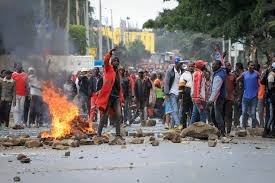Patrick Gathara
Protests have returned to the streets of Kenya’s towns and cities, as the country gets to the latest stage of the slow-motion revolution it has been undergoing for over 40 years. Animated by anger over the state’s arrogance, corruption and long-running neglect of their needs as currently manifested in its tax proposals, a new generation has taken up the fight, and it is glorious to behold.
Two years ago, the same Kenyan youths were derided as “disengaged” for failing to register as voters and to turn up for the general election. “It’s a huge dent in democracy,” wailed one analyst. Yet far from being disengaged, the young are demonstrating that what they reject are what I described at the time as “the political rituals of their parents” – the formalised ways of democratic participation that their elders valorise but that have consistently failed to deliver on their promise. They are “opting for other, more effective modes of engagement with governance in the years in between elections”. This is not new. Coming of age in the 80s and 90s, their parents too had rejected the rules of participation set for them by the independence generation, which privileged ideas like development, unity and peace – many times at the expense of democratic freedom and individual rights. They developed new ways to engage with an oppressive regime and overbearing state. As they rallied to “mass action” to demand reform of the political system, they adapted to and took advantage of global changes such as the end of the Cold War to create powerful coalitions and institutions outside of the state which channeled popular discontent into meaningful action.
By the early 2000s, their movement had transformed the country’s politics, opened up space for competition for power, expanded the range of freedoms enjoyed by Kenyans, and rebooted the economy. However, following the demise of the 24-year dictatorship of Daniel arap Moi, and with it, the end of the The June 9 European Parliament elections saw a significant shift in European politics, which is likely to have a lasting impact on the future of the EU.
Far-right parties emerged as the leading force in five EU member states — France, Italy, Belgium, Austria and Hungary — and also improved their electoral performance in key countries such as Germany and the Netherlands.
With 180 seats secured, conservative and populist far-right parties, though still a minority and internally divided, will now wield considerable influence in the European Parliament.
Already in power in Hungary, Italy and the Netherlands, far-right movements are gaining momentum across Europe. Despite their diverse backgrounds and ideologies, these political groups share three core beliefs:
First is a nativist, ethnic-based concept of national identity. This vision of national identity is confined to an organic bond within a homogeneous blood community.
Second is a strong culturalist notion of the nation. They view their nations as an ahistorical civilizational entity to be protected from external influences, leading to anti-immigration policies and widespread Islamophobia.
Third is a radical sovereigntism that challenges the rule of law and independent institutions. American political scientist Fareed Zakaria has dubbed these far-right regimes “illiberal democracies,” noting their disconnection between formal electoral mechanisms and the liberal values underpinning pluralistic, open democracy.
It is crucial to distinguish the far-right movement from the liberal conservative parties that once formed a solid component of Western democracies. These parties were characterized by skepticism toward progressivism, attachment to traditional religious values and adherence to order and authority, yet they upheld basic liberal principles (private and civil liberties, equal citizenship, separation of powers).
The rise of the far-right can be attributed to several key factors, including the new political landscape of contemporary democracies, breaking away from the binary division of right and left from the First Industrial Revolution, the erosion of the working class, the multilateralist challenge faced by European societies amid massive immigration, and reactions to globalization.
Sociologists and political scientists have explored and analyzed these phenomena, but this does not diminish the significance of the recent electoral event that has shaken EU countries.
This event occurred in a volatile context, marked by the ongoing Ukraine war, intense confrontations with emerging global powers and uncertainty in Euro-American relations as Donald Trump eyes a potential return to the White House.
Some researchers view these trends as signaling the “decline” or “defeat” of the West (Michel Onfray, Emmanuel Todd) and the end of European global hegemony (Bertrand Badie).
The far right, with its euroskeptic and sovereigntist stance, fails to provide credible solutions to Europe’s pressing challenges. It mirrors a genuine social and political unease, manifesting in tangible changes, yet it lacks the conceptual tools and practical mechanisms needed to address the continent’s multifaceted crisis.
French writer Paul Valery famously remarked in 1919: “We modern civilizations have learned to recognize that we are mortal like the others.” This phrase, uttered during the grim aftermath of the First World War, resonates strongly today. Europeans, who once held the status of the “conscience of humanity” and led the world, now find themselves in the modest position of “spectators of history,” as German philosopher Peter Sloterdijk put it. As Europe grapples with its diminished global role, the rise of the radical right appears more a symptom of historical regression than a path forward for the continent.KANU party’s four-decade rule, many of them went to bed with the state, either as elected politicians or appointed into government. Civil society organisations, which had been a bedrock of the anti-Moi agitation, were effectively decapitated. Other important pillars of the movement, such as the independent media and religious institutions, ceased aggressively challenging the state and largely chose to cash in on their relationships with the new actors running it.
Like the independence generation before, which had largely reproduced the predatory colonial state they had fought, they too re-established the old corrupt networks that adulterated competitive politics, undermined accountability, and in some ways attempted to roll back the freedoms Kenyans had won. In the aftermath of the violence that followed the disputed 2007 election, the reform movement briefly regrouped and pushed through their generation’s pinnacle achievement – the adoption of a new constitution, the first to be negotiated in Kenya with involvement of the people.
The current youngsters have grown up in the world their parents built and have taken for granted many of the things their elders saw as achievements. Their eyes are firmly fixed on the future, not the past, and their horizons are necessarily much wider. They are also utilising the tools of the moment – the internet, digital technologies, social media – in ways that confound and subvert the existing order to organise and give effect to their political action. In its baffled response, the duplicitous regime of President William Ruto, who learned his trade at the feet of Moi, is speaking from both sides of its mouth. On the one hand, Ruto himself has spoken in praise of the protesters and suggested he is ready to talk to them. Meanwhile, the police force has attacked, killed and injured them, and resorted to kidnapping and disappearing those it imagines are their leaders.
However, this movement is much less hierarchical and much more egalitarian than any Ruto has so far encountered, and is thus less vulnerable to the tactics Moi taught him. The youth have resisted politicians’ attempts to take it over. They are propagating their messages using social media rather than the mainstream press. On Sunday, they hosted a marathon seven-hour discussion on Twitter Spaces that had 60,000 participants. They use online platforms to plan, fundraise, and organise medical teams and blood donation drives for injured comrades. The old fogies who had dismissed them as irrelevant “armchair activists” just two years ago are struggling to catch up, but the train has left the station. The young are not interested in the frameworks that have been used by journalists and politicians in the past to manipulate their parents, manage expectations and subvert outcomes. Doubtless they will make mistakes and may even, in some aspects, regress into the ways of their elders. Regardless, we are all living in their world now. They were once called the leaders of tomorrow. Tomorrow is here.Far-right surge in EU elections signals major shift







